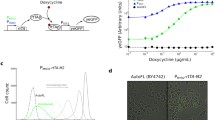Abstract
The tetracycline-regulatable system (TRS) has become a widely adopted tool for modification of gene expression and analysis of gene function in mammalian cells, plants and transgenic animals. We have studied the potential application of the TRS in gene therapy, using a single vector containing both the tetracycline-controlled transactivator (tTA) and the tTA-responsive promoter (tRP) transcribing mouse GM-CSF. Stable 293 cells established using this vector were used to study the kinetics of the TRS in response to various tetracycline analogues. Dose–response studies show that doxycycline is the most potentanalogue in abolishing tTA activity. Kinetic studies indicate that, at 1000 ng/ml, all the analogues have similar efficiencies in down-regulating the system in a given time. In contrast, following the removal of the analogues, there is a temporal, dose-dependent delay in resumption of the tRP activity. The time taken for resumption of near-optimal tRP activity is approximately 48 h for tetracycline, 144 h for anhydrotetracycline, 192 h for minocycline and 216 h for doxycycline when cells were pretreated with 1000 ng/ml of these antibiotics. This property of the analogues can be employed in planning a desired course of transgene regulation.
Similar content being viewed by others
Author information
Authors and Affiliations
Rights and permissions
About this article
Cite this article
A-Mohammadi, S., Alvarez-Vallina, L., Ashworth, L. et al. Delay in resumption of the activity of tetracycline-regulatable promoter following removal of tetracycline analogues. Gene Ther 4, 993–997 (1997). https://doi.org/10.1038/sj.gt.3300491
Received:
Accepted:
Issue Date:
DOI: https://doi.org/10.1038/sj.gt.3300491
- Springer Nature Limited
Keywords
This article is cited by
-
PSMA imaging as a non-invasive tool to monitor inducible gene expression in vivo
EJNMMI Research (2024)
-
A tunable dual-input system for on-demand dynamic gene expression regulation
Nature Communications (2019)
-
Autoregulatory lentiviral vectors allow multiple cycles of doxycycline-inducible gene expression in human hematopoietic cells in vivo
Gene Therapy (2010)
-
Optimization of the Tet-On system for regulated gene expression through viral evolution
Gene Therapy (2006)
-
A novel doxycycline inducible autoregulatory plasmid which displays ‘on’/‘off’ regulation suited to gene therapy applications
Gene Therapy (2000)




